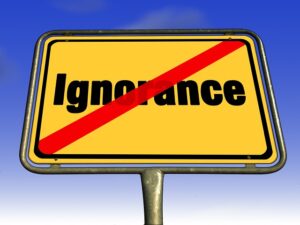Estate planning in Massachusetts requires knowledge and precision – and this means that knowing what to do is equally important as knowing what NOT to do.
The law heavily regulates the subjects of Wills and estate administration. Since the goal of making a Will is to ensure that your assets are distributed according to your wishes, it will be a grave self-inflicted harm to have the Will nullified by the court or failed gifts due to an avoidable error or omission.
In simple terms, if you fail to plan your estate or your plan
(the Will) fails, the law will step in and distribute it according to the intestacy laws made by the Massachusetts State Legislature.
If you hope to avoid such failure, you should know the five essential mistakes to avoid as a Testator.
The above also applies to appointed Executors and in some cases, the executors may even be held liable.
Five Things to Avoid as a Testator in Massachusetts
Sometimes, a Will may not be declared invalid because it has met all the formal requirements. However, there are instances that the wishes expressed in the Will may be impossible to execute either because of the recipient’s death, incapacity, conflict of interest, or loss of the property from the estate.
This section will help you understand how to ensure that your gift or Will does not fail or go to the wrong person.
1. Making Bequeaths to a Witness
The Massachusetts General Law requires that a Will ought to be witnessed by “disinterested” parties. An “interested” witness is a beneficiary (or whose spouse is a beneficiary) that acknowledges the Testator’s signature in a Will.
If your Will has been signed by an “interested” party, it does not invalidate the Will, but the gift is deemed void and returns to the residuary estate. The exception to this rule is where two other disinterested witnesses signed the Will.
Whatever you do, it is best you do not allow beneficiaries to witness your Will.
2. Bequeathing Gifts or Legacies not Belonging to the Testator
For one or several reasons, a gift under a Will may have ceased to belong to the Testator at the time of distribution. Maybe it was sold or granted to another party by court order or used to settle a debt.
The implication is that the beneficiary will not be able to lay claim to that gift or its monetary compensation in value. You can only imagine the palpable disappointment on your child’s face if he missed out on your Ford Mustang Shelby GT500 or an old favorite house that you rushed to sell to settle claims from a creditor.
This issue can be corrected by inserting a clause for an alternative gift or monetary compensation. You ought to consider updating your Will regularly for the same reason.
3. Bequeathing Directly to Minors
One mistake to avoid when making a Will is to bequeath monetary gifts or a real estate legacy to a minor. Massachusetts law does not permit the control of an inheritance by a minor. Hence, the court will appoint a guardian to manage the inheritance on behalf of the minor till they turn 18 years old.
This court appointment may have less-desirable consequences as many needs of the minor may be ignored and the money bequeathed to the minor may not be well-invested. It is important that you appoint a guardian or trustee yourself to manage the inheritance on behalf of your minors according to your wishes till they reach the legal age.
4. Omitting to Appoint a Residuary Beneficiary
Unknown to many testators, a Will is far more than a simple document – it has many moving parts. A critical arm of those moving parts is the residuary estate.
Take for instance, that you have distributed all your assets as far as you can remember. But you forgot to include your joint share in your mother’s estate or some stock you owned in a company. The principle is that every property you did not bequeath under your Will or perhaps were distributed, but failed for some reason to be effective, such property will revert to your “residuary estate”.
If the residuary estate is not bequeathed to a defined beneficiary, it will be distributed according to the intestacy laws of Massachusetts. To prevent this, you must insert a clause that bequeaths all your residuary estate to one or more beneficiaries.
5. “My Last Will and Testament” does not mean “Impossible to Update”
You can amend or update your Will to reflect your current financial position by making a supplementary Will or Codicil. This will help you prevent cases of ademption, lapses, or abatement.
If you also went through with a divorce after making your Will, it is important you revise your Will, or a chunk of your estate may still go to your ex-spouse. Learn from our earlier post what happens to alimony payments once the paying spouse dies.
Five Things Executors Must Avoid in Probate
An executor (or executrix) is a personal representative nominated by the Testator to administer the Will. There are several responsibilities that the executors of an estate must observe. A breach of these responsibilities may result in personal liability or even contempt of the probate court, notwithstanding that the Will had been concluded several years before.
Some of the common pitfalls to avoid as an appointed executor include:
1. Rushing to Conclude the Distribution Within the First One Year
Creditors have a superior claim to beneficiaries in the distribution of an estate. They are permitted by law to exercise this claim within one year of the testator’s death.
Thus, it is advisable to wait till after the one-year period to commence distribution of the estate. Or you may be held responsible for the liabilities.
2. Not Paying the Estate Taxes Before Distribution
Owing to the pressure from the decedent’s family and other beneficiaries, executors may be tempted to distribute the properties in the estate before paying the estate taxes (including inheritance tax, if any). The implication of this decision is that if the residual estate is insufficient to pay the estate taxes, the executors will be held personally liable.
It is important to reiterate to the family members and beneficiaries that estate taxes must be fully paid before distribution.
3. Acting Alone or Self-Dealing
Usually, a testator will name more than one executor (in case a corporation is not named instead). This means that co-executors have to take decisions at least in the majority to avoid in-fighting and allegations of breach of fiduciary duties.
Where other executors are unavailable or unwilling to act, you may get them to resign or agree to appoint you to act in their stead (maybe with other willing co-executors) or you may apply for the court to remove them.
It is also wrong for you to sell off any of the properties to yourself or any entity that you control, or even way below the market value to a third party. If you do so, a beneficiary of the estate may apply to the court for your removal and to account for proceeds from the sale.
4. Failure to Keep Proper Records
Proper record-keeping is the hallmark of a detailed executor acting in good faith. This is because beneficiaries are allowed to bring claims several years after against an executor. Proper records may be the saving grace for an executor caught in this turmoil.
5. Not Seeking the Advice of Professionals Before Taking Decisions
Executors are permitted to seek the advice of experienced estate planning professionals and lawyers in Massachusetts before making decisions on the estate. This will reduce the risk of liability for you and your co-executors. Estate planning professionals may include accountants, lawyers, financial advisors, etc.
You can consult with a Wills attorney from the Law Offices of Richard Mucci to get comprehensive legal advice on your role and probable decisions to avoid future liabilities.
FAQs
What is Ademption?
Ademption occurs when a property that was bequeathed in a Will no longer exists or had been validly sold off at the time of distribution. Therefore, the gift has adeemed and the beneficiary will be unable to receive that gift.
What is Abatement?
Abatement occurs when the resources in the estate are not enough to settle the estate taxes, administrative expenses, creditors, and bequests.
Since bequests are almost the last on the list, there may not be enough to gift the beneficiary his/her due gift. Hence, the gift will be said to have abated.
When is a Gift Deemed as a Lapse (or what are lapses)?
A lapse is deemed to have occurred when a beneficiary under a Will dies before the Testator. If $50,000 was bequeathed by Anne to her son, John, but John dies while in military action before Anne, her gift to John will be deemed to have lapsed.
The state of Massachusetts has Anti-Lapse provisions that allow spouses or blood relatives of beneficiaries whose gifts have lapsed to receive such gifts.
For more information, visit our website Mucci Legal or contact us for a free legal consultation today.



